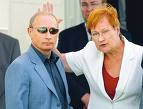Condoleezza Rice'i poliitiline testament
 Värskes Foreign Affairsi numbris on pikema esseega üles astunud USA välisminister Condoleezza Rice. Uuest Ameerika realismist rääkiv "Rethinking the National Interest" on justkui Rice'i välispoliitiline testament. Õigupoolest on see samas ka jätk kaheksa aastat tagasi kirjutatule, mil Rice oli alles Georges W. Bushi kampaanianõustaja.
Värskes Foreign Affairsi numbris on pikema esseega üles astunud USA välisminister Condoleezza Rice. Uuest Ameerika realismist rääkiv "Rethinking the National Interest" on justkui Rice'i välispoliitiline testament. Õigupoolest on see samas ka jätk kaheksa aastat tagasi kirjutatule, mil Rice oli alles Georges W. Bushi kampaanianõustaja.Midagi väga põrutavat siiski Rice ei ava. Ta kirjutab sisuliselt veelkord üle selle, mida on nii tema kui president Bush korduvalt oma kõnedes ja ka tegudes väljendanud. Mõned viited siiski.
2000. aastal alustas Rice oma artiklit nii: "The United States has found it exceedingly difficult to define its "national interest" in the absence of Soviet power./.../ During these fluid times, one can affect the shape of the world to come." Samas pakkus ta viis peamist suunda, millele tuli keskenduda vabariiklikul administratsioonil:
* to ensure that America's military can deter war, project power, and fight in defense of its interests if deterrence fails;
* to promote economic growth and political openness by extending free trade and a stable international monetary system to all committed to these principles, including in the western hemisphere, which has too often been neglected as a vital area of U.S. national interest;
* to renew strong and intimate relationships with allies who share American values and can thus share the burden of promoting peace, prosperity, and freedom;
* to focus U.S. energies on comprehensive relationships with the big powers, particularly Russia and China, that can and will mold the character of the international political system; and
* to deal decisively with the threat of rogue regimes and hostile powers, which is increasingly taking the forms of the potential for terrorism and the development of weapons of mass destruction (WMD).
Eks igaüks võib hinnata, kui õnnestunud on olnud nende prioriteetide realiseerimine Bushi administratsioonil. Loomulikult tuleb lisada, et toonase artikli avaldamise hetkeks oli 11. septembrini 2001 jäänud veel poolteist aastat.
Nüüd pöörab Rice taas oma artiklit sisse juhatades tähelepanu esmalt Venemaale ja siis Hiinale. Venemaa kohta ütleb Rice muuseas, et "Russia is not the Soviet Union. It is neither a permanent enemy nor a strategic threat. " Samas on erinevalt 2000. aastast peatähelepanu arusaadavalt Lähis-Idal. Kuid läbivaks jooneks on ikkagi usk realismi ja idealismi sümbioosi. Ehk siis suurte huvide ühitamine suurte väärtustega.
"An international order that reflects our values is the best guarantee of our enduring national interest, and America continues to have a unique opportunity to shape this outcome," kirjutab Rice oma artiklit lõpetades.
Kindlasti võiks päris mitmete Rice'i seisukohtade üle vaielda, kuid laiemas vaates on USA välisministri positsioon suuresti haakuv meie, Eesti välispoliitiliste põhimõtete ning tõekspidamistega. "America kept faith with the people of the Baltics that they would be independent and thus brought the day when NATO held a summit in Riga, Latvia," kirjutab Rice ühe näitena USA usust vabaduse ja demokraatia edukusse.



Kommentaarid
Tõnu